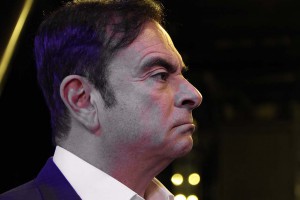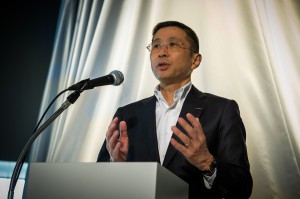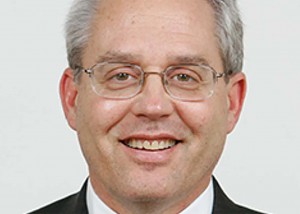
Former Nissan CEO Carlos Ghosn, shown here in January 2018, reportedly has lost over 20 pounds while in detention.
Nissan’s former Chairman Carlos Ghosn has been indicted again, this time on charged of breach of trust, a development that could again delay his release on bail.
The once-powerful executive has been held in solitary confinement in the Tokyo Detention Center since his arrest on November 19 and already faces charges related to claims he underreported his income by about $44 million between 2011 and 2015. Prosecutors are reportedly looking at other potential charges that arose from a months-long investigation conducted by Nissan.
Ghosn, who claimed innocence during his first court hearing earlier this week, wasn’t the only one to face a legal setback on Friday. Prosecutors also laid out charges against the 64-year-old executive’s former colleague Greg Kelly, as well as Nissan itself.
(Click Here for our coverage of Ghosn’s first court appearance this week.)
The latest charges against Ghosn came the same day his attorney, Motonari Ohtsuru, filed a request to have Ghosn released on bail. That now appears unlikely, and Deputy Chief Prosecutor Shin Kukimoto told reporters in Tokyo that his detention could last for months.
“We believe that there was enough to charge and go to trial,” Kukimoto said, according to the AP, “and he will be guilty.”
Ghosn has been credited with helping save Nissan in 1999 when he was sent to Japan by French automaker Renault in order to manage a $6 billion bailout. He eventually became CEO of the Japanese company and, later, its chairman. Ghosn also was named CEO of Renault, a title he continues to hold despite his arrest in Japan.
The Brazilian-born executive was fired by Nissan, however, as well as by Mitsubishi. Ghosn oversaw a Nissan-funded bailout of the smaller Japanese firm in 2016.
Some observers have questioned the merits of the ongoing case against Ghosn, wondering whether it was triggered by Nissan’s desire to reduce the influence of Renault which holds a 43% stake in its alliance partner. Contributing to those concerns have been statements made by Nissan CEO Hiroto Saikawa who declared Ghosn “too powerful” immediately after his arrest. Saikawa has also expressed his desire to reduce Renault’s oversight of his company.
But Nissan has itself come under fire, critics questioning how Ghosn could have hidden millions of dollars in pay and committed other financial misdeeds without the company’s knowledge. Among other things, the former chairman has been accused of using Nissan funds to purchase homes in Lebanon and Brazil.
The latest charges allege that Ghosn improperly transferred some of his own financial losses to the carmaker and questions payments of $14.7 million to a Saudi businessman.

Charges filed against the automaker Friday question how Nissan executives, such as CEO Hiroto Saikawa, wouldn't have known about Ghosn's alleged financial misdeeds.
During his brief appearance in court earlier this week, a handcuffed Ghosn declared, “I have been wrongly accused and unfairly detained based on meritless and unsubstantiated accusations.” He also said all actions he took were done “honorably, legally and with the knowledge and approval of the appropriate executives inside the company.”
Separately, Saudi businessman Khaled Al-Juffali’s company issued its own statement, asserting that the payments it received “were for legitimate business purposes.”
For its part, Nissan said in November that the charges against Ghosn emerged from a lengthy investigation triggered by a “whistleblower.” But at least one aspect of Ghosn’s comments may come back to haunt the automaker. Prosecutors appear to agree that the automaker should have been aware of at least Ghosn’s understatement of income.
That is at the center of the new charged brought against the automaker on Friday. Former Nissan executive Kelly was also indicted on charges related to claims Ghosn hid millions of dollars of income over the 2011-2015 period.
Under Japanese law, a suspect normally can be held for just 10 days, but prosecutors have taken steps to repeatedly extend Ghosn’s detention, despite concerns raised by a Tokyo judge. They did agree to the release of Kelly on December 25, a move that followed a plea from his wife that noted Kelly was scheduled for major neck surgery before his arrest.
(Nissan exec Kelly released; Ghosn still in Tokyo detention. Click Here for the story.)
Shortly after Ghosn’s appearance in court on Tuesday he reportedly came down with a fever, though the government claims he recovered quickly. Nonetheless, the executive’s wife issue a statement from their home in Paris Thursday night raising her concerns over his health.
“I am pleading with the Japanese authorities to provide us with any information at all about my husband’s health,” Carole Ghosn said. “We are fearful and very worried his recovery will be complicated while he continues to endure such harsh conditions and unfair treatment.”
Reports from Japan indicate Ghosn has faced a difficult incarceration, confined to a small cell and allowed to step out only 30 minutes a day for exercise. He has been interrogated on a daily basis and prosecutors have repeatedly demand he sign a confession which was reportedly written in Japanese, a language he does not speak.
During his court appearance, the one-time automotive superstar appeared gaunt, his son Anthony telling a Paris newspaper Ghosn had lost over 20 pounds while in detention.
During the more than seven months he has been in custody, Ghosn has not been allowed to see family members. His only visitors have been his lawyers and embassy officials. The 64-year-old is a Brazilian native who spent much of his career working in France. He also holds citizenship in Lebanon, where his family is from.
Prosecutors on Friday said they will now end the daily interrogations and will only meet with Ghosn upon his own request.
(Nissan boosts range, performance as it launches new version of all-electric Leaf. Click Here for more.)


“…since his arrest on November 19…” “…During the more than seven months he has been in custody…” How do you get 7 months from mid-November to mid-January?
Sigh…seven weeks.
What happens when a reporter has worked 18 days straight (including the holidays)…
Thanks Paul. Your still the best!